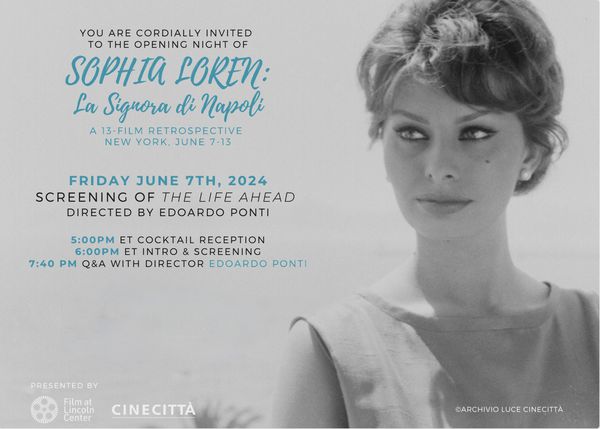 |
| Cinecittà and Film at Lincoln Center’s Sophia Loren: La Signora Di Napoli |
Edoardo Ponti’s The Life Ahead (La Vita Davanti A Sé, starring his mother Sophia Loren); Mario Mattoli’s Poverty And Nobility (Miseria E Nobiltà, adapted from Eduardo Scarpetta’s play) opposite Totò and Enzo Turco; Alessandro Blasetti’s Too Bad She’s Bad (Peccato Che Sia Una Canaglia, an Alberto Moravia short story) with Marcello Mastroianni and Vittorio De Sica; Dino Risi’s The Sign Of Venus (Il Segno Di Venere) with Franca Valeri and Raf Vallone; Vittorio De Sica’s Two Women (La Ciociara, an Alberto Moravia novel) with Jean-Paul Belmondo and Eleanora Brown, plus De Sica’s 1963 and Marriage Italian Style (Matrimonio All’Italiana) with Mastroianni, and The Voyage (Il Viaggio) with Richard Burton; Stanley Donen’s Arabesque with Gregory Peck; Francesco Rosi’s More Than A Miracle (C’era Una Volta) with Omar Sharif; Charlie Chaplin’s A Countess From Hong Kong with Marlon Brando; Ettore Scola’s A Special Day (Una Giornata Particolare), and Robert Altman’s Ready To Wear (Prêt-à-Porter) with Mastroianni, Anouk Aimée, Kim Basinger, Lauren Bacall, Julia Roberts, Tim Robbins, and Forest Whitaker were the films selected for Sophia Loren: La Signora Di Napoli, organised by Florence Almozini and Tyler Wilson of Film at Lincoln Center, and by Paola Ruggiero, Camilla Cormanni, and Marco Cicala of Cinecittà, co-produced by Cinecittà, Rome.
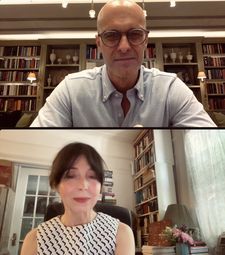 |
| Edoardo Ponti with Anne-Katrin Titze: “Gabriel Yared is an exceptional composer and he is also a wonderful man and is truly a musical scholar.” |
The Life Ahead is a recognition and celebration of differences, to use poet Audre Lorde’s words. Resembling a bit the “cour des miracles” assembled by Pietro Marcello for Scarlet, both films have fantastic scores by Academy Award-winning composer Gabriel Yared (for Anthony Minghella’s The English Patient). We are reminded that this embrace of difference is the only path into the future that can save humanity from its warfaring and selfish destruction of all that is perceived as other.
In Edoardo Ponti’s insightful and affecting take on Romain Gary’s novel (previously adapted for the screen in the Academy Award-winning Madame Rosa with Simone Signoret in the title role), Sophia Loren plays the overlord of a band of outcasts. A Holocaust survivor and former prostitute, Madame Rosa now takes care of the children in her neighborhood. 12-year-old Momo (Ibrahim Gueye), an orphaned boy from Senegal who gets by selling drugs for a local fishmonger (Massimiliano Rossi), is suggested by the wise Dr. Coen (Renato Carpentieri) to join Iosif (Iosif Diego Pirvu) and little Babu (Simone Surico) in Madame Rosa’s apartment.
Lola (Abril Zamora), who is transgender, has her musical son Babu there for daycare, while Iosif, who reluctantly studies for his Bar Mitzvah, will share a room with the newcomer. In order for him to receive some instruction in Muslim culture, Madame Rosa finds Momo a job with her friend Hamil (Babak Karimi), a merchant who will teach the boy how to mend antique carpets and much more. Sophia Loren’s wisdom, strength and warmth shine through in this performance as it combines facets of characters we have encountered through her during her long, illustrious career.
From New York City, Edoardo Ponti joined me on Zoom for an in-depth conversation on The Life Ahead and his mother Sophia Loren.
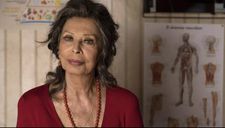 |
| Sophia Loren as Madame Rosa in Edoardo Ponti’s The Life Ahead |
Anne-Katrin Titze: Very nice to meet you!
Edoardo Ponti: You too!
AKT: You are in New York to present this festival, the first retrospective of your mother’s work. Are you excited?
EP: I am much more than excited. I am excited, I am moved, I am inspired by the initiative. It is really something remarkable that is happening here in New York.
AKT: As her son, how did you discover your mother’s films? Are there maybe still films you haven’t seen? I was wondering how that process was for you.
EP: How does a son, or a child, discover the profession of their parents is really the question. How did you discover the profession of your parents? It was always around in the house. I don’t think there was ever a moment where I didn’t know that my parents were in the filmmaking industry, the business of storytelling and creating moments for people to be inspired by. It was something that was always around us. It was at the dinner table, at the lunch table, talking about stories. Not so much the business aspect of it, but it was really the storytelling aspect of it, the characters, the moments.
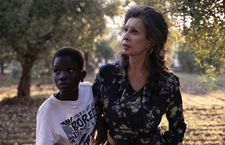 |
| Momo (Ibrahim Gueye) with Madame Rosa (Sophia Loren) |
AKT: Seeing your mother for the first time on the big screen, do you have a memory of that?
EP: I don’t.
AKT: Let’s talk about The Life Ahead, which is a beautiful film and not the first time you worked with your mother. You made a Jean Cocteau adaptation with her prior, no?
EP: The Jean Cocteau adaptation was the second. The first was a movie that we did in the early 2000s, called Between Strangers, along with Pete Postlethwaite, Klaus Maria Brandauer, Malcolm McDowell, Mira Sorvino and Deborah Unger. That was our first film together. Then came Jean Cocteau’s Human Voice and then The Life Ahead.
AKT: Both Cocteau’s play and the Romain Gary novel are very challenging. Did you think this material is really something she could sink her teeth into?
EP: Of course. One of the lessons, if I may put it this way, that my parents, my mother, taught us is to risk. There is no artistry otherwise. You can attempt artistry if you attempt to risk. Both La Voix Humaine of Jean Cocteau and La Vie Devant Soi by Romain Gary were very, very difficult projects. Not only on a narrative level, you know, how best to adapt these two iconic pieces of French literature, but also for my mother a tour de force.
 |
| Iosif (Iosif Diego Pirvu) with Babu (Simone Surico) in The Life Ahead |
Of course, Jean Cocteau - a one-woman play over the course of 40 minutes she is on the phone with the man she loves as he is leaving her for another woman - that’s a big tour de force and it was quite an amazing experience working with her on that. There should have been a documentary on us working on that together, honestly.
AKT: Yes!
EP: Every time I see the movie, I’m like, I can’t believe there isn’t a making-of because the making of it was so fascinating. And working on The Life Ahead presented its own challenges for many other reasons. Working with the wonderful Ibrahim Gueye, for whom The Life Ahead was the first movie and surrounding my mother with these amazing eclectic theater actors from Italy, from Renato Carpentieri to Abril Zamora to Massimiliano Rossi. The movie presented its own set of challenges.
AKT: It’s a great cast, also the children. Babu [played by Simone Surico] is absolutely fantastic! I’ve heard he’s going to be a guitarist?
 |
| Lioness with Momo (Ibrahim Gueye) |
EP: I don’t think Babu knew he was going to be a guitarist until I put a guitar in his hand on that day!
AKT: I think he continues to be seen strumming in scenes where he doesn’t even have a guitar!
EP: He was very very funny. His mother was lovely and we had a great time with him.
AKT: Let’s stay with the music, maybe not Babu’s. With your composer, Gabriel Yared, you couldn’t have reached any higher - Anthony Minghella’s The Talented Mr. Ripley, The English Patient, and, and, and. His music gives the film an extra aura of miracle.
EP: Gabriel Yared is an exceptional composer and he is also a wonderful man and is truly a musical scholar. There’s nothing that he doesn’t know about the history of music and by association and as a result, nothing that he cannot do when it comes to music. This movie presented many particular challenges when it came to music because the music had to track in a way almost a state of mind, Momo’s emotional arc.
 |
| Sophia Loren in Edoardo Ponti’s Human Voice |
So we go from very contemporary trap beat music at the beginning of the movie and slowly, as Madame Rosa’s influence and the feelings that Momo starts feeling for Madame Rosa enter his heart, so does the music change gradually. We slowly then start to introduce more of an orchestral feeling, so at the end of the movie the score is a completely different score from what we started with. That musical arc was quite challenging to pull off. But if anybody could it was absolutely Gabriel Yared.
AKT: He also did the music for Pietro Marcello’s Scarlet and I think both films have something else in common. They are about a group of people who on the surface seem quite different, but they are all very human and recognise something in each other.
EP: And really the movie in a way speaks to that, you know, what defines a family? What is a family? That’s really one of the themes of this movie.
AKT: In many of the roles your mother played, I got the sense of someone who knows just a little bit more than we do and she has that twinkle in her eyes. I am thinking for example of the super silly scene in the shower in Arabesque with Gregory Peck. It makes you wonder what Stanley Donen was thinking, putting her in this position. It could be very icky, but the expression on Sophia Loren’s face turns the scene on its head and makes it into something funny and kind of charming.
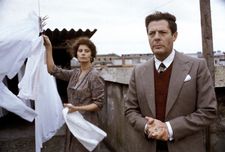 |
| Sophia Loren with Marcello Mastroianni in Ettore Scola’s A Special Day |
EP: You know, my mother, that little glint in the eyes, as you call it, my mother is self-aware without being self-involved. That’s really what it is. And she has the wisdom of being able to be detached to be able to analyse the situation and then make a decision whether or not she wants to participate in that situation and how she wants to participate in that situation.
And being Neapolitan, there’s always a very healthy dose of irony and really also self-deprecation in a sense in her performances. Of course the common thread in her performances is her humanity, is the honesty that she brings to all of the moments that she creates. And all of these moments are also always informed and coloured by her very strong Neapolitan roots.
AKT: This makes me think of her performance in A Special Day - it is so so terrific! There are so many layers she gives this woman.
EP: Not only is it an amazing performance but it’s also an exceptional classic in her body of work, there’s no question about it. And the relationship that she and Marcello create under the masterful direction of Ettore Scola is truly something amazing to behold.
AKT: The next few days you will have to listen to all the stories of people meeting your mother, so here is mine. I met her once in Milan at the Four Seasons at the reception, checking in. I turned around and there she was, wearing, I think, a zebra dress, and I was so star-struck, I simply stood staring. And she gave me this wonderful smile, as if to say, it’s okay, I get this all the time. I loved her even more for that. It was a little after Robert Altman’s Prêt-à-Porter had come out, which is also in this retrospective.
 |
| Gregory Peck and Sophia Loren in Stanley Donen’s Arabesque |
EP: It was a special movie, because Robert Altman’s style is very improvisational. He would have multiple cameras in a space and you wouldn’t quite know where the camera was and you would just behave and interact with your actor, not knowing really what he was shooting or not shooting. And my mother was not used to this kind of filmmaking. But it’s really a testament to how she is and very quickly adapted to that style. And the movie speaks for itself. Of course, you know, Robert Altman also did wonderful things recalling past movies of hers, the famous striptease scene.
AKT: Yes!
EP: Which is then reenacted, I’d say maybe 30, 35 years later, with the difference that in this scene Marcello falls asleep instead of them doing what we expect them to do.
AKT: In the lioness we see at the end of The Life Ahead, is there something of your mother in her? Does she have something of a lioness?
EP: Definitely. I think all mothers to their sons and daughters are lionesses. That element of protection, of being able to count on somebody to be there for you in many ways, for affection, for love, for protection. Obviously a lioness checks those boxes. And of course for Ibrahim’s character Momo in The Life Ahead, having been raised without a mother, she having perished so early in his life, is in want of that maternal comforting and protection.
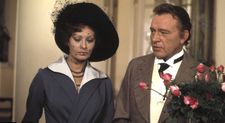 |
| Sophia Loren with Richard Burton in Vittorio De Sica’s The Voyage |
What’s beautiful about the movie, by the end, when Madame Rosa perishes, her body perishes but everything that she will have taught Momo and indeed even her own self stays with Momo and enters his heart forever. And that’s what enables him or allows him to move ahead in life. Because he’s strengthened by the lioness that was in her.
AKT: A very strong moment is when the boys are discussing the number tattooed on her arm and they call it “a code” and “counter espionage” and speak of her “bat cave”. They have no idea what Auschwitz means, what the number represents.
EP: No idea, he even in the other scene mispronounces it. He doesn’t even know how to say it.
AKT: And watching the film now, you wonder how many people also don’t know anymore. At the same time, it makes you think of espionage films your mother was in. It’s a very interesting, multifaceted way of looking at this character of Madame Rosa.
EP: She herself being so young having to suffer through bombs in Italy clearly left its traumatic mark also on her. That’s something she has never ever forgotten in her life and that’s why she’s been such a champion for people who have suffered.
 |
| Sophia Loren and Marlon Brando in Charlie Chaplin’s A Countess from Hong Kong |
AKT: What are your mother’s favourite flowers? Not mimosas, or are they?
EP: Mimosas are Madame Rosa’s, that was also in the book. My mother’s favourite flowers? You know what, she loves orchids, frankly. She loves roses. My father used to love roses; he had a rose garden. They shared this common love for roses.
AKT: How is she?
EP: She’s doing fantastically well. She had this fall in autumn but she’s been going to physiotherapy, literally every day. You know, she’s very regimented and disciplined about this. Because she was intent on not walking with any kind of supports. So she’s doing very well, she came to L.A. recently to be with my daughter on her 18th birthday and graduation, and she’s resting now and doing extremely well. I’m very happy for her.
AKT: I’m sending virtual orchids to her!
 |
| Marcello Mastroianni with Sophia Loren in Vittorio De Sica’s Yesterday, Today And Tomorrow |
EP: Thank you!
AKT: Thank you and have a beautiful evening tonight!
EP: Thank you so much, Anne-Katrin!
Sophia Loren La Signora Di Napoli runs through Thursday, June 13 with 4K Restorations of Too Bad She’s Bad, Two Women, 1963, Marriage Italian Style, Arabesque, A Countess From Hong Kong, A Special Day, and 2K DCP restorations of Poverty And Nobility, The Sign Of Venus, and The Voyage.





















